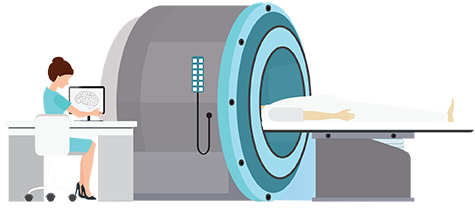
Radiology is the field of medicine that uses medical imaging to diagnose and treat injuries or illnesses. Radiologic technologists and technicians are the professionals who use different types of technology to perform the scans that the doctors rely on to make the correct diagnoses and create the best treatment plans for their patients.
There are different specialties within the field of radiologic technology, depending on the level of training and type of equipment that professionals are using. These jobs include:
For prospective radiology students, there are many schools in North Carolina to choose among. These are some of the colleges and universities offering radiology programs, according to the National Center for Education Statistics:
Regardless of which specialty you choose, you’re likely to follow the same initial steps to starting a radiologic technology career in North Carolina:
The pay for radiology jobs in North Carolina can depend on your specialty and where you work, both in terms of location and employer. Check out the table below for data from the Bureau of Labor Statistics on the employment and average annual salaries for jobs in radiology in North Carolina.
| Career | Total Employment | Annual Mean Wage |
|---|---|---|
| Cardiovascular Technologists and Technicians | 1,130 | 65,230 |
| Diagnostic Medical Sonographers | 1,940 | 65,770 |
| Magnetic Resonance Imaging Technologists | 870 | 65,690 |
| Nuclear Medicine Technologists | 490 | 68,790 |
| Radiologic Technologists | 7,350 | 57,110 |
Source: 2016 Occupational Employment Statistics and 2016-26 Employment Projections, Bureau of Labor Statistics, BLS.gov.
Copyright © 2024 Radiology-Schools.com. All Rights Reserved.
Sources for school statistics is the U.S. Department of Education’s National Center for Education Statistics.
Disclosure: EducationDynamics receives compensation for the featured schools on our websites (see “Sponsored Schools” or “Sponsored Listings” or “Sponsored Results”). So what does this mean for you? Compensation may impact where the Sponsored Schools appear on our websites, including whether they appear as a match through our education matching services tool, the order in which they appear in a listing, and/or their ranking. Our websites do not provide, nor are they intended to provide, a comprehensive list of all schools (a) in the United States (b) located in a specific geographic area or (c) that offer a particular program of study. By providing information or agreeing to be contacted by a Sponsored School, you are in no way obligated to apply to or enroll with the school.
This is an offer for educational opportunities, not an offer for nor a guarantee of employment. Students should consult with a representative from the school they select to learn more about career opportunities in that field. Program outcomes vary according to each institution’s specific program curriculum. Financial aid may be available to those who qualify. The financial aid information on this site is for informational and research purposes only and is not an assurance of financial aid.